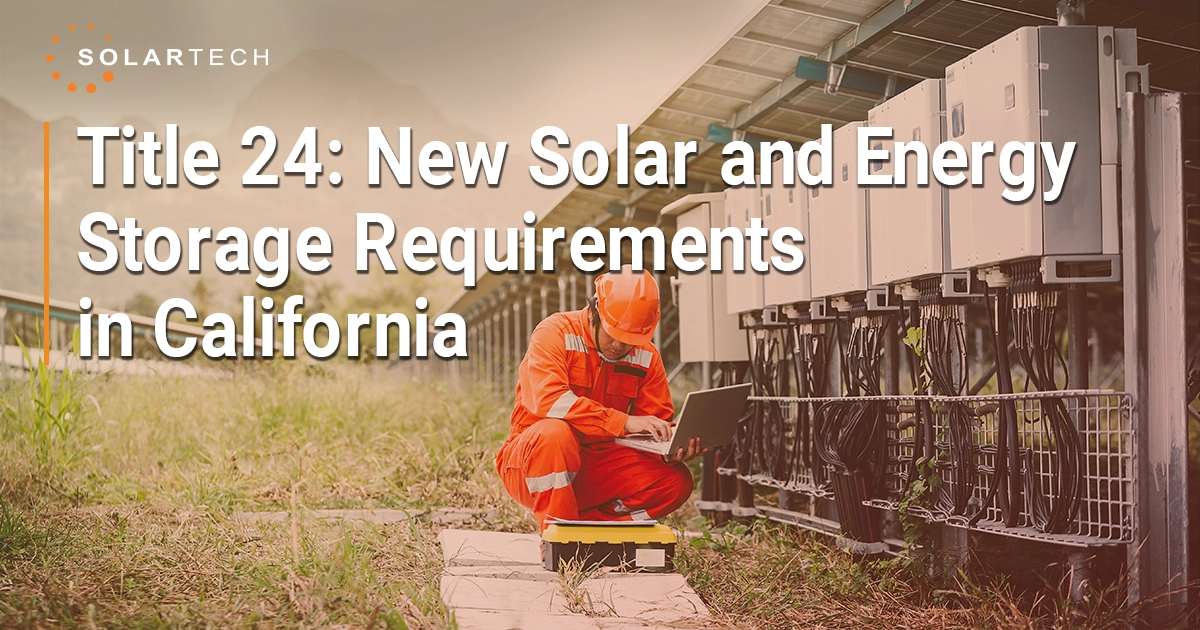In 2023, California updated its Title 24 building energy efficiency standards to require all new residential and commercial buildings to be solar-ready and to have energy storage systems installed. These new requirements are part of California’s efforts to reduce greenhouse gas emissions and reach its goal of 100% clean energy by 2045.
What is Title 24?
Title 24 is a set of building energy efficiency standards adopted by the California Energy Commission (CEC). Title 24 is updated every three years to reflect new technologies and energy efficiency trends. These requirements include HVAC systems, lighting, energy efficiency measures, building envelope, and water heating.
What are the new solar and energy storage requirements for multi-family housing?
The latest Title 24 regulations are the following:
- Low-rise multifamily buildings must have solar zones covering at least 15% of the total roof area, excluding skylights. These solar zones can be situated on the roof, building overhangs, or overhangs of nearby structures within a 250-foot radius. This requirement applies to structures with mixed occupancy as well, ensuring comprehensive coverage.
- For low-rise multifamily buildings with interior common areas, occupant sensors must control up to 20% of the floor area, optimizing energy usage in these shared spaces.
- The updated lighting requirements entail several key provisions. Permanent labels indicating maximum rate wattage must be prominently displayed. Each room should have independent manual controls for personalized lighting adjustments. Moreover, multi-level lighting control options and improved shutoff controls, including occupant sensors, automatic time switches, and similar devices, are mandated.
- Multi-family buildings are now required to incorporate on-site renewable energy systems. This necessitates developers to offset approximately 50-60% of both the building and tenant’s total energy consumption, promoting sustainable practices and reducing reliance on non-renewable sources.
- A battery is now required alongside solar PV systems, with its size determined by the size of the solar system.
By adhering to these updated guidelines, low-rise multifamily buildings can enhance their energy efficiency, embrace renewable energy, and contribute to a greener and more sustainable future.
What are the new solar and energy storage requirements for industrial and commercial?
California’s Title 24 has implemented new provisions impacting industrial and commercial projects permitted since Jan. 1, 2023. SolarTech can help navigate these regulations and showcase the benefits of solar and energy storage on your property.
Key provisions include:
- The mandate for photovoltaic (PV) systems and energy storage
- PV systems must meet approximately 60% of buildings’ electricity loads based on factors such as conditioned floor area, climate zone, and building type.
- Electric Vehicle (EV) charging requirements, including EV-capable spaces and chargers. Larger parking lots must have EV chargers installed, with the percentage varying based on size.
- Battery storage is now required alongside solar PV systems for all new constructions, with the size of the battery’s storage system determined by the size of the solar system.
How to comply with the new Title 24 requirements
There are several ways to comply with the new Title 24 requirements. One option is to work with SolarTech who is familiar with the requirements and install the required amount accordingly. Another option is to monetize energy as the Landlord, described below.
How to generate revenue with solar
These requirements present opportunities for monetizing the energy transition. Industrial and multi-family owners can benefit by offering discounted power to tenants, effectively increasing net operating income and creating an added recurring revenue stream. By installing solar to offset tenant usage, the landlord becomes the energy producer for the property.
Through tenant billing and Virtual Net Metering (VNEM), owners can allocate billing credits based on individual tenant consumption, making it financially advantageous for both single-tenant and multi-tenant scenarios.
By embracing these requirements and exploring innovative solutions, building owners and developers can not only comply with regulations but also unlock financial benefits and contribute to a sustainable future.
SolarTech provides turnkey solutions in solar, energy storage, and EV charging stations. From compliance with Title 24 to providing tailor-made financing options, our experts partner with owners on all their renewable energy needs. Get in contact with one of our experts today. We’ll make sure you project is Title 24 compliant.


